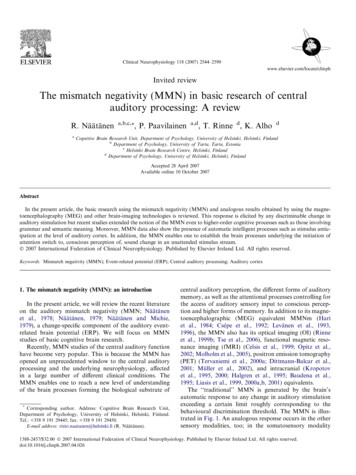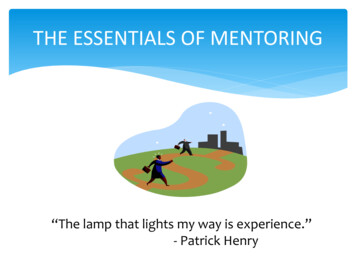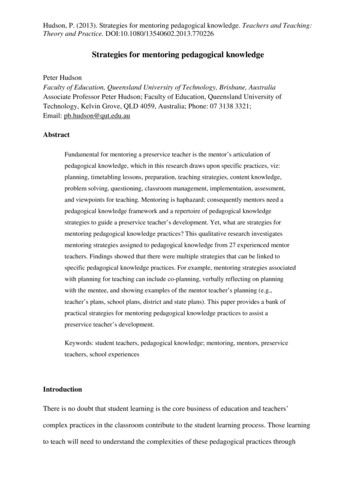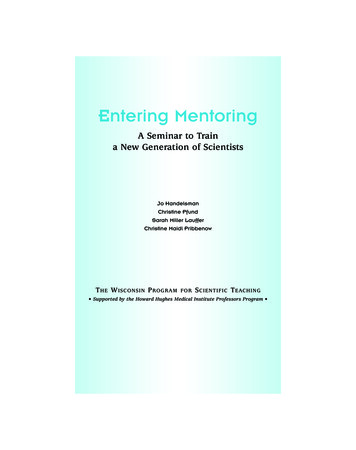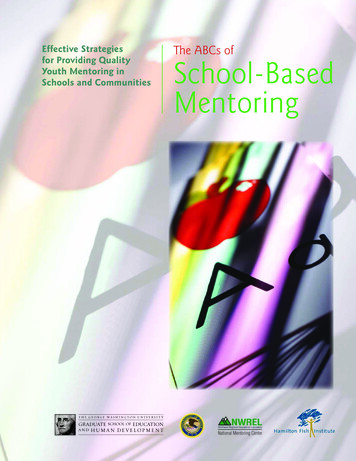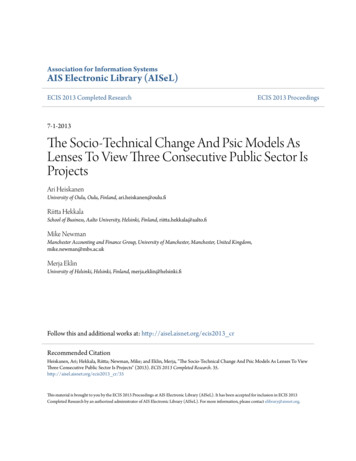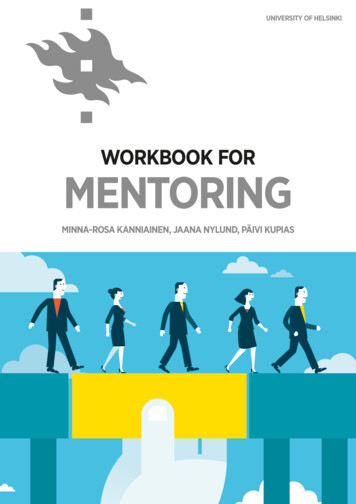
Transcription
UNIVERSITY OF HELSINKIWORKBOOK FORMENTORINGMINNA-ROSA KANNIAINEN, JAANA NYLUND, PÄIVI KUPIAS
“Mentoring is a journeywhere mentors are not simplyproviding actors with a road mapand travel tips, but also walksome of the journey togetherwith them.The co-journeying enables bothmentors and actors to develop;and they experience a newjourney that is full of surprises.”THE PSYCHOLOGY OF COACHING, MENTORING AND LEARNING. LAW, HO. 2013.
Dear reader,The popularity of mentoring has increased considerably in recent years. These days, various partiesoffer mentoring programmes that cover various themes arising from various needs. The University ofHelsinki has also hosted several different mentoring programmes over the years. Students are offeredmentoring through programmes run by student associations, soon-to-graduate students are mentoredby alumni members, and the need for mentoring among doctoral students has been recognised, too.The University has also offered mentoring for newly appointed professors and academic leaders, andhas supported teachers, supervisors and experts through peer mentoring.Some of these programmes offer pair mentoring, some group mentoring. Mentoring can also takeplace outside programmes; initiating a mentoring relationship can be as simple as asking someoneto be your mentor.In our experience, both mentoring programme participants and independent mentor–actor pairswould benefit from support materials and practical tools. We have therefore produced this mentoringworkbook for both mentors and actors to use as part of a mentoring programme or independentarrangement to provide support throughout the mentoring process. This workbook is written forpractical purposes. Although it is not an academic or theoretical work, it begins with a description ofmentoring as a method – only covering what the mentor and actor might find useful. We recommendthat mentors also read the parts intended for actors, and vice versa.This workbook covers the mentoring process in chronological order from start to finish and aimsto offer practical tools that you can use throughout the mentoring process. It also introduces certainthemes that arise regularly in the University’s mentoring programmes. These themes aim to illustratethe kinds of topics often covered in mentoring; they are meant to act as examples, not as restrictions.The themes discussed during the mentoring process should always arise from the actor’s needs andbe adjusted to serve the actor’s objectives.This workbook is written by the HR Development and Occupational Wellbeing unit and CareerServices unit of the University of Helsinki. Päivi Kupias from Tevere Oy has acted as an expert duringthe project and has had an indispensable influence on the workbook and its exercises.Sincerely,MINNA-ROSA KANNIAINENUniversity of Helsinki, Career Servicescareerservices@helsinki.fiJAANA NYLUNDUniversity of Helsinki, HR Development and Occupational Wellbeing unithrd@helsinki.fi
ContentsWHAT IS MENTORING? 5Guiding principles 6Approaches 9Roles 10Structure and duration 12GETTING STARTED 16Getting to know one another 16Defining objectives 18Laying down ground rules 22MENTORING THEMES 24Professional growth and career developmentWellbeing and coping 29Changes and transitions 3424PROGRESSING WITH MENTORING 37Clarifying and redefining objectives 37Changing situations in life 41Developing the mentoring relationship 42Turning insights into action 44Continuous feedback 46CONCLUDING THE MENTORING PROCESS 47Evaluation and feedback 47What comes after mentoring? 52Bibliography 53Appendix 54 Minna-Rosa Kanniainen, Jaana Nylund, Päivi Kupias Publisher: Helsingin yliopisto, 2017Layout: Veera Aalto, Indico Oy Illustrations: iStockphoto
WHAT IS MENTORING?Mentoring is a collaborative relationship that aims to promote learning, increase know-how andfacilitate the actor’s professional growth. Mentoring is a simple method founded on the interactionbetween the mentor and the actor, whose questions, interests and objectives determine what is coveredin mentoring. Mentoring conversations are based on confidentiality, commitment and openness.Mentoring is about setting objectives and looking for ways to achieve them.In work settings, mentoring has long been used to share and pass on the expertise of experiencedemployees to new employees and to transfer tacit knowledge. Mentoring is used especially to facilitatethe career development and mobility of managers and experts, but also to orientate new employees.In education, mentoring programmes offer students advice and guidance on making career plans,finding work and planning for their future.The mentoring process has a strong focus on development. Although mentoring concentrates onthe actor’s development, the mentor will also learn and develop in the interactive process. In fact,mentors often find a fresh approach to analysing their own career and planning their own future inthe process.In mentoring, the journey itself is rewarding. The fruits of mentoring are often picked throughoutthe long process in the form of a series of insights and steps forward.Mentoring experiences“I got thecourage to view myopportunities froma broader perspective andto make choices basedon my wishesand interests.”ACTOR“Mentoring gaveme a chance tolearn another unit’spractices.”MENTOR“Mentoringgave me a newapproach to my workand taught me toappreciate it more.”“I got greatpractical tips for myeveryday work asa manager.”MENTORACTOR“Mentoring taughtme the skills thatI need to find work,improved my professionalself-knowledge and gaveme self-confidence.”ACTOR“I gained newperspectives on careerplanning and learned toview my career and choicesin a new light.”“It wasrewarding tochat with a mentorwho understood thechallenges of myposition.”MENTOR“Youth power,friends anda new tool.”MENTORACTOR5WORKBOOK FOR MENTORING
GUIDING PRINCIPLESSuccessful mentoring has three guiding principles: commitment, confidentiality and clear objectives.Pay attention to these, especially at the early stages of the process, and discuss the following:Am I committed to a long-term mentoring process?Am I building an atmosphere of mutual trust thatallows genuine interaction?What are my mentoring objectives?In a successful mentoring relationship, both of you follow all three principles. For the mentoringrelationship to grow deeper and for both to have a successful experience, consider all three cornersof the triangle below.GUIDING PRINCIPLES IN MENTORINGClear objectivesConfidentialityCommitmentCommitmentAs an actor, you commit to meeting your mentor or mentoring group regularly. You also commit tolearning, including spending time thinking and working on the mentoring themes between meetings.You are responsible for setting your objectives and choosing your mentoring themes, and should letyour mentor know the following meeting’s theme in advance so that your mentor can also preparefor meetings. It is important for you and your mentor to lay down ground rules and discuss what todo if your schedules conflict or you encounter other challenges.As a mentor, you commit to attending meetings and following commonly set rules. Mentors usuallydo mentoring alongside their day job and receive no compensation for it. Actors should bear this inmind and not expect their mentor to use unreasonable amounts of time.The mentor and actor should discuss time limits together and decide what means of communication they use. Actors choose the mentoring themes, but mentors should consider the best ways towork on them. A theme can be approached, for example, through an exercise or reflection task introduced in this workbook.6WORKBOOK FOR MENTORING
Confidentiality and mutual trustThe mentoring relationship is founded on confidential conversations and mutual trust. Mentors andactors typically find it easy to trust one another because mentoring is usually voluntary for bothparties.Confidentiality is something you should discuss together to reach an agreement about what youcan and cannot share outside the mentoring relationship. As a general rule, you can share personalthoughts and insights with other people, but you should keep anything related to other people confidential.You can and should discuss confidentiality when the process begins, but mutual trust can onlybe born in interaction, after both parties have deemed each other trustworthy. When you trust eachother, the mentoring relationship survives difficult questions, constructive criticism, delicate issuesand possible setbacks. On the other hand, trust can be easily lost if one of you shares something confidential with outsiders. If trust is broken during the mentoring relationship, it is very hard to regain.Mutual trust requires that both of youConsider the other party able and suitable asa mentor/actor and conversation partnerAre convinced of the other party acting openly and honestlyExpress your goodwill by showing interest and giving positive feedbackProve you are worthy of trust, for example, by holding onto your agreementsClear objectivesA successful mentoring experience requires notonly commitment and mutual trust, but also clearobjectives. Without them, mentoring conversationshave no clear direction, rendering mentoring ratherfruitless. Clear objectives help give the lengthy processstructure, allow the actor to set concrete goals andmake it easier for the mentor to prepare for meetings.Mentoring objectives should be set right at thebeginning, but they can reviewed and redefined laterin the process.Mentoring builds on the actor’s needs and objectives. Mentors cannot set objectives for their actors,but they can help clarify them. Actors can set onemain objective or several smaller objectives that theyapproach from different angles. Actors typically havesomething that has led them to seek mentoring, andthey use this as their starting point when they startdiscussing their objectives with their mentor.7WORKBOOK FOR MENTORING
EXERCISEFor the mentoring process to succeed, you should start the processby answering the following questions:What are we committing to?How can we promote mutual trust?How can we ensure good communication and interaction?How can we determine realistic objectives?8WORKBOOK FOR MENTORING
APPROACHESMentoring can be approached in various ways, and it can involve different roles. Typically, mentoringinvolves one mentor and one actor. In such pair mentoring, the more experienced person – thementor – offers his or her knowledge, skills, experience and ideas to the less experienced person – theactor – to use. Pair mentoring can be intensified by introducing several mentor–actor pairs to eachother for them to exchange experiences.Mentoring can also be a group activity. In group mentoring, a mentor (or two) mentors the group,but group members also receive peer support from each other. In contrast, in peer mentoring, thegroup consists solely of actors, with one actor leading and facilitating the group. In this case, the groupleader is not a mentor, but an equal member of the group and also there to learn. Peer mentoringblends the roles of mentor and actor and rests instead on a dialogue of equals to create a new kindof shared understanding and knowledge.The following table illustrates different approaches to mentoring. Both mentors and actorsshould be aware of these approaches, regardless of the type of mentoring they are involved in. Theseapproaches do not rule each other out; instead, adopting different approaches at different stages ofthe mentoring process can be particularly advantageous. Mentors should assess the best approachfor each situation to help actors reach their objectives.MENTORING APPROACHMENTOR’S ROLEACTOR’S ROLETraditional mentoring:transferring knowledgeThe mentor is a provider ofinformation who shares hisor her understanding andexperience.The actor is a passiverecipient who uses the moreexperienced person as amodel.The mentor as the actor’ssupporter and guideThe mentor supports theactor’s thought processes,shares his or her experiencesto promote learning, andoffers guidance.Discussion is based onthe actor’s objectives andquestions, and learning isbased on the actor’s insights.The mentor as a coachand sparring partnerThe mentor listens to theactor and acts as a mirror.The mentor does not offeradvice or guidance, butsupports the actor’s ownlearning process.The actor is very active: he orshe takes initiative, determineshis or her objectives, seeksthe necessary support andtools for achieving them, andasks the mentor questions tolearn from the mentor.Peer mentoring / reversementoringThe mentor is the actor’sequal, and conversationis based on a dialoguebetween peers.The actor is an active andequal partner. Mentoring isfounded on shared thinking,ideation and the building ofknowledge.KAdapted from Kupias & Salo 2014Traditionally, mentoring has been regarded as a way of “transferring” the experienced mentor’sknow-how and experience to the younger actor. According to modern theories of learning, knowledgecannot be transferred from one person to another as such, but it is obvious that actors can nevertheless9WORKBOOK FOR MENTORING
learn from their more experienced mentors. At best, the transfer model allows both the actor andmentor to benefit from the mentor’s sharing of his or her knowledge and experience. In this approach,the actor is mainly a passive recipient, which conflicts with recent thinking.By taking a different approach, mentoring can resemble coaching. When the mentor acts asa coach, his or her role is not to transfer knowledge or even offer guidance, but to listen and askquestions and thus facilitate the actor’s own learning processes. This approach works well when, forexample, clarifying the actor’s career objectives.Mentoring compares favourably to many other methods of self-development because it can employdifferent approaches and roles, depending on the actor’s objectives. The purpose of mentoring is notto reach a common end result or a shared understanding. Mentoring is successful when the partiesclarify their own thinking by comparing thoughts and reflecting on their ideas. Actors should discussdifferent approaches with their mentor to verbalise the thoughts and expectations each party has fortheir role. If the actor and mentor have very different ideas about each other’s roles, their expectations for the mentoring process can conflict.Pair MentoringGroup MentoringPeer MentoringPeer Group MentoringROLESThe mentor – A reliable supporterThe table (page 9) illustrating different approaches to mentoring describes the different roles of thementor. Mentors can indeed help actors in many ways. They can be guides and role models, they canbe understanding listeners, sparring partners and coaches, or they can be critical friends who evokenovel thoughts and help question established ideas and fixed thought patterns. They can also buildbridges and lead their actors deeper into the themes of professionalism, working life, the professionalrole or personal strengths. Moreover, they can be their actors’ peers, evening out the traditional settingof an experienced mentor and inexperienced actor.10WORKBOOK FOR MENTORING
Whatever their role, mentors are not employment agents, sponsors, bosses, career or guidancecounsellors, initiators, tutors or therapists. They do not make decisions for their actor or direct theiractor strongly into one direction. Mentors should also not judge their actors’ choices, although theycan help them see things from a novel perspective. Mentors must act responsibly: they should beappreciative of their actor’s questions and objectives, and instead of intentionally trying to influencetheir actors, they should offer different viewpoints to help them make decisions.The purpose of mentoring is to promote the actor’s development, but mentors often also gain newthoughts, ideas and insights during the process. After the mentoring process, mentors are often betterable to analyse their own career and plan their future from a fresh perspective. Being a mentor is avaluable experience, and one that often gives mentors genuine joy when they get to help their actors.The actor – An active developerIn mentoring, the active participant is the actor. The primary purpose of mentoring is to promote theactor’s development. For this reason, it is crucial that the actor sets the mentoring objectives, whichthen determine the themes discussed in mentoring meetings.Actors are responsible for guiding their own learning and for applying their mentor’s knowledge.Actors decide how they respond to the experiences, advice and guidance their mentor shares. Theentire mentoring process rests on the actors’ desire and ability to develop themselves and have conversations that promote the achievement of their objectives.Actors are also responsible for ensuring that the mentoring process progresses and for making anypractical arrangements. It is the actor’s duty to contact the mentor before a meeting to make sure thatboth are aware of the following meeting’s theme and to organise the spaces for meetings, if necessary.If face-to-face meetings require one participant to travel, the actor should mainly be the one travelling.CHECKLIST FOR THE ACTORCHECKLIST FOR THE MENTORCommit to a long-term process byensuring you truly have the timefor personal development. Defineyour mentoring objectives anddiscuss them with your mentor.Be prepared to reserve enoughtime for the meetings. Let youractor define his or her mentoringobjectives, but help clarify them ifnecessary.Keep a learning diary and/orwrite down your objectives in thementoring plan.Listen to and take into account youractor’s wishes and objectives.Listen and ask questions – trust isbuilt through genuine presence andinteraction.Don’t be afraid to ask questions,address areas of personaldevelopment or discusschallenges.Be prepared to share your knowledgeand experience.Be bold in your dreams andobjectives.Be open to new ideas, thoughts andfeedback. Consider what is best foryour actor’s personal development:offering direct advice or findingsolutions by discussing matterstogether.Take responsibility for yourpersonal development and formaking practical arrangements.Start putting ideas acquired inmentoring discussions into useimmediately.Let your actor take responsibility forhis or her own personal developmentand learning.11WORKBOOK FOR MENTORING
STRUCTURE AND DURATIONMentoring should be a relatively long process: preferably 6–12 months. A long process leaves timefor both parties to build trust and for the actor to not only process the mentoring themes and bringup issues that arise during the process, but also to revisit themes discussed at the early stages ofmentoring. The mentoring process should have a clearly defined beginning and end. During theprocess, the mentor–actor pair or mentoring group usually meets once a month. Pair meetingstypically last one to two hours, group meetings an hour and a half to three hours. The participantscan freely determine the time and place of their meetings.The mentoring process can be viewed as a large arch that comprises multiple small arches – individual meetings.THE MENTORING ARCHMiddle: Clarifying and redefining objectives Acknowledging changing life situations Developing the mentoring relationship Turning insights into action Giving and receiving regular feedbackEnd: Evaluating and identifyingwhat was learned Giving and receivingfeedback and thanks Concluding the mentoringprocess and agreeing onfuture communicationBeginning: Getting to know one another Defining objectives Committing to the process and layingdown ground rules“The mentoring process should havea clearly defined beginning and end.”12WORKBOOK FOR MENTORING
MeetingsTo enable focused working, meetings should conform to some sort of structure. For example, you canstart meetings by catching up. After exchanging news, you can use most of the meeting to discuss theactor’s pre-chosen theme. At the end of each meeting, you should evaluate your progress and give eachother feedback. Unless the upcoming meetings’ themes have already been decided, you should alsodecide the following meeting’s theme either at the end of your session or before the following meeting.The actual “meat” of the meeting is the discussion about the mutually agreed theme. The themecan be discussed through example cases, which the actor first introduces and you then discusstogether. In group mentoring, members take turns introducing example cases and discussing them.Sometimes meetings can centre around a current issue or be spontaneously lead. In such meetings,however, it is easy to lose focus of the mentoring objectives. Moreover, spontaneous discussion canbe challenging for the mentor to lead in group mentoring.MEETING STRUCTUREMeeting structure: Beginning (Catching up, discussing what’s happened sincethe last meeting and any exercises done between meetings,and confirming this meeting’s objectives) Topical issues (Remember to reserve time for discussingtopical issues) Theme or example case (Discussing the actual topic of themeeting) Evaluation and assigning exercises (Evaluating thismeeting, assigning any exercises to be done before thenext meeting, and deciding on the next meeting and itsarrangements)13WORKBOOK FOR MENTORING
EXERCISEAt the end of each meeting, discuss the following:What did we talk about today? What topics did we cover?What did we do to reach our mentoring objectives?What working methods worked well?What could we do differently?What do we want out of our next meeting?14WORKBOOK FOR MENTORING
EXERCISEAfter each meeting, actors should also write a learning diary entry or make notes of whatwas discussed and what insights you had. Keeping a learning diary helps you focus on yourobjectives and notice your progress. You can write about the following:What did we talk about today? What topics did we cover?What thoughts did this evoke in me during the meeting?What did I learn or understand?How did our topics tie in with my objectives?In group mentoring, actors can take turns writing brief summaries of the meetings and sendthese to the mentor and other group members.15WORKBOOK FOR MENTORING
Middle: Clarifying and redefining objectives Acknowledging changing life situations Developing the mentoring relationship Turning insights into action Giving and receiving regular feedbackBeginning: Getting to know one another Defining objectives Committing to the process and layingdown ground rulesEnd: Evaluating and identifyingwhat was learned Giving and receiving feedbackand thanks Concluding the mentoringprocess and agreeing onfuture communicationGETTING STARTEDGETTING TO KNOW ONE ANOTHERFor the mentoring relationship to rest on a solid foundation and develop, it is important that youspend time getting to know one another.You should meet as people, not only as a mentor and actor, and take time to get to know eachother. This helps you promote trust, improve interaction and understand the other person’s viewpoints and values.If you skip this stage and dive right in into defining objectives, you can have difficulty understanding where the other person is coming from and what motivates him or her, making it harder for youto define mutual objectives.Mentoring programmes provide their participants with instructions on how to get started with theprocess. Those with independent arrangements can help things along by sending each other introduction letters or doing a preliminary exercise before their first meeting.To start getting to know one another, discuss the following questions:Who am I?Where do I come from?Why did I decide to become a mentor/actor?What things are important to me at the moment?16WORKBOOK FOR MENTORING
Should you wish to, you can also do the lifeline exercise. In this exercise, you can choose things youwant to share in mentoring.EXERCISETIMELINE Draw a timeline of your life on a piece of paper. Include important memories: life events and people related to them, major decisions andchanges of course, themes, stages, studies, work, your achievements so far, and anything elseyou want to include. Study your drawing. Do you notice recurring themes or patterns? How does the path you’vetaken so far meet your future path? How have you made choices previously? How do the dreamsand interests of your childhood and youth affect your life? Who are the people you considerimportant role models, who are the people that walk your path on your side, and who are thepeople that have influenced your life?In groups, you can also use the following exercise to get to know other group members: Choose a picture, object or song and use it to introduce yourselves.“How does the path you’ve takenso far meet your future path?”17WORKBOOK FOR MENTORING
“The objectivesset by the actorprovide mentoringits framework anddirection.”DEFINING OBJECTIVESTo ensure a successful mentoring experience, the process should have clear objectives. The objectivesset by the actor provide mentoring its framework and direction. Actors should discuss these objectiveswith their mentor to ensure that both parties are driving the mentoring process in the same directionand working towards a shared goal. Actors can have several objectives, and the objectives can bereviewed and redefined during the process.Examples of mentoring objectives Expanding one’s skillsetGrowing in a new positionReaching goals related to workReaching goals related to working methodsClarifying and strengthening one’s professional identityEnhancing one’s expertise and in-depth knowledgePlanning the future of one’s own work, career or life in generalBuilding networksManaging time and stressIncreasing wellbeing at workSharing empirical and tacit knowledgeIn group mentoring, all group members have their own objectives. The group must define its mutualmentoring objectives and themes together, and ensure that all group members are committed to them.The group should discuss each member’s personal objectives in its first meeting and define the group’smutual objectives based on the members’ individual objectives.18WORKBOOK FOR MENTORING
Tools for clarifying objectivesThe following tools and conversation topics can help clarify mentoring objectives.EXERCISEDiscuss mentoring objectives from different perspectives using the following questions:FROM THE ACTOR’S PERSPECTIVEWhat do I want to achieve through mentoring?When the mentoring process ends, what will be different and what will I have learned?What things do I want to maintain and enhance through mentoring?Where do I need my mentor’s support?19WORKBOOK FOR MENTORING
EXERCISEFROM THE MENTOR’S PERSPECTIVEWhat kind of support could I have used earlier in my career?If I could have been a actor, what would I have used mentoring for?How do I want to help my actor?When the mentoring process ends, what do I hope my actor has gained?As a mentor, what do I want to get from the mentoring process?20WORKBOOK FOR MENTORING
EXERCISEActors can make their skills visible to their mentors and set mentoring objectives using the handof know-how exercise:MOTIVATIONInterests, attitude,objectivesSKILLSTHE HAND OFKNOW-HOWPractical skills, lifeskills, social skillsKNOWLEDGE23EXPERIENCEWork experience, lifeexperience, hobbies4Studies, degrees,expertiseKnow-how is not justknowledge and skills. Atits best, it is built out ofknowledge, skills, motivation,experience and contacts.CONTACTS5Associations,networks, conversationpartners1Actors can make their skillsvisible through the hand ofknow-how exercise.EXERCISESWOT ANALYSISFor assessing work, career and life ATS21WORKBOOK FOR MENTORING
The purpose of the SWOT analysis is to help actors describe their current situation and define theirobjectives in concrete terms.In the matrix, you identify your internal strengths and weaknesses and the external opportunities and threats related to work, career or your current life situation in general. You can then choosewhich area you want to focus on in mentoring. You should complete the SWOT analysis again at theend of the mentoring process to identify what has changed during the process.Mentors can also benefit from the SWOT analysis. With it, mentors can describe their expertiseand thus offer their actors new perspectives on how to use mentoring and what topics to cover.LAYING DOWN GROUND RULESFor the mentoring relationship to be effective for everyone, you should not only define objectivestogether, but also discuss ground rules and practices. This can be done either in writing or orally aslong as everyone is clear on the rules.The mentoring agreement or plan can include the following(see Appendix, page 54):1.Mentoring objectives2. Topics and themes, including what will not be covered3. Confidentiality: What can and cannot be discussed with others4. Duration: The beginning and end of the mentoring process(the recommended duration is 6–12 months)5. The time and place for meetings and practices for reschedulingor cancelling meetings (the recommended meeting interval isroughly one month)6. Communication during mentoring, including channels and means7.Preparing for meetings (Responsibilities: What is expected ofeach party)8. Giving up mentoring mid-process and what to do if this happens.22WORKBOOK FOR MENTORING
You can do the circle of influence exercise together to help define your mentoring objectives andthemes. This exercise can help identify topics and themes you can influence through mentoring andrule out topics mentoring cannot influence. You can redo the exercise, if you later need to discusshow you want to use your meeting time and whether or not you are working towards the mutuallydefined objectives.CIRCLE OF INFLUENCEThings I cannot decideor influenceThings I can influenceThings I can decideThings I can adjust myattitude towa
WORKBOOK FOR MENTORING MINNA-ROSA KANNIAINEN, JAANA NYLUND, PÄIVI KUPIAS . THE PSYCHOLOGY OF COACHING, MENTORING AND LEARNING. LAW, HO. 2013. . Changing situations in life 41 Developing the mentoring relationship 42 Turning insights into action 44 Continuous feedback 46

